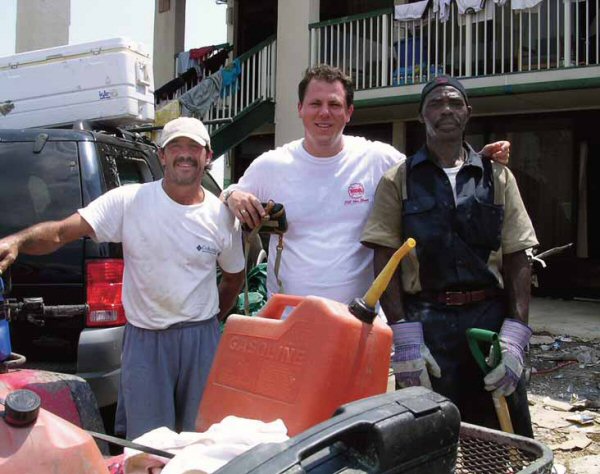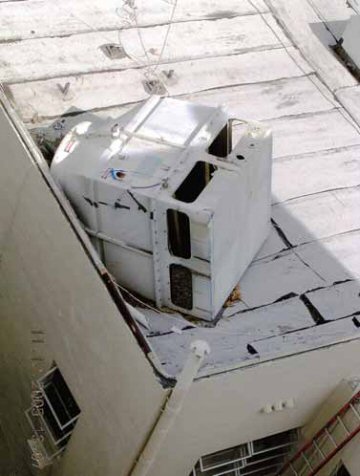SEJournal Online is the digital news magazine of the Society of Environmental Journalists. Learn more about SEJournal Online, including submission, subscription and advertising information.
Feature
By DAN GRECH
"I promised myself the next time I covered a traumatic event,
I’d be trained in how to sensitively cover the victims of trauma."
 |
|
Reporter Dan Grech (center) with Tommy Kidd, Jr. (left) and Horace Hodges (right) at the Coast Inn and Suites in Waveland, Miss., while covering the traumatic aftermath of Hurricane Katrina in 2005 for the syndicated public radio business show, Marketplace. Photo © Dan Grech.
|
Five days after Hurricane Katrina hit, I arrived at the Coast Inn and Suites in Waveland, Miss. Though I had no training in trauma coverage and had never before covered a disaster, I was lead reporter on Katrina for Marketplace, the public radio business news show. I’d already filed a dozen reports chronicling the destruction along the Gulf Coast from the storm surge east of the eye. But I wasn’t prepared for Waveland. Katrina had wiped half the town off the map. Homes were swept inland into piles of timber, or swept out to sea onto sand bars, or flooded up to their eaves. The Coast Inn and Suites was built at the intersection of two main roads, on the highest point of town. When I arrived, about two dozen survivors huddled on the untouched second floor. The motel had become a refugee camp – one that would launch me on a personal odyssey with valuable lessons for fellow journalists thrust into traumatic stories.
I spent several days at the Coast Inn and Suites. Bill Lady, the motel’s owner, had opened his hotel to all comers at no charge. Tommy Kidd, Jr., a house painter, owned the generator that powered the fans that chased away the summer heat. He siphoned gas for the generator by threading a thin hose into the gas pan of abandoned cars and sucking until he gagged. Horace Hodges, a security guard at a local mall, carried his wife on his shoulders during the hurricane because she couldn’t swim. The storm surge had reached his neck by the time a passing boat dragged him and his wife to safety.
One afternoon, I found Horace sobbing in a stairwell, exhausted emotionally and physically after days of recovery work. Tommy seemed to find a new confidence in his leadership role since the storm. Bill was coming to terms with losing a lifetime of work. I listened faithfully, as I was trained. But I didn’t know how to respond to their searing honesty and raw emotion. I felt unprepared.
I wandered the hotel, meeting guests, collecting their stories. I found Curtis Fouquet in a breezeway connecting the two wings of the motel. He was splayed out in a lawn chair, his bulk spilling over the edges. It was the dead of summer and the heat was stifling. Fouquet’s shirt was ringed with sweat, and there was no escape. His nephew, Steven Mayfield, was fanning him with a piece of cardboard.
Curtis owned the nearby Kajun Kitchen. He had just barely outrun the storm surge. During the storm, he had a heart attack and was revived with a nitroglycerin tablet under his tongue. His home was gone, his business was gone, and he was in tremendous pain.
I asked Curtis if I could interview him about his near-death experience. Once I began recording, he told me about his son Kevin, who had been murdered by a robber a few years back while on the late shift at the Kajun Kitchen. The day after his heart attack, Fouquet visited his son’s grave.
“All I said is I wish I was with you. I want to be with you. I’m tired of life,” he said, staring straight ahead with glassy eyes. “I said it’s all gone. Everything we worked for. There’s a point that you gotta give up, a point you can’t handle anymore. And I just asked my son to take me.”
His voice pitched upward. “I didn’t think I’d make it through this. I said this is my way out, I’m coming. And for some reason I made it, you know, and I don’t know why. What is it? What does God have for me to do? What are his intentions for all these people? They’re homeless. They have nothing, nothing, nothing to go on.”
I watched a bead of sweat roll down Curtis’ face. His nephew stood nearby, his arms crossed, listening. I was unsure what to do. Curtis was clearly traumatized. He probably needed professional psychological help. Was I making it worse by interviewing him? Curtis looked up at me. “You come to the point when you’re ready to lay your head down and go to sleep. And you hope you don’t wake up anymore.”
Was Curtis about to commit suicide? I felt panicked. I didn’t know what to do.
That night, I listened back to Curtis’ words as I prepared my report for Marketplace. I trimmed out the pauses, the stumbles, the incoherent phrases. I edited his plea for help for maximum emotion. Three days later, as part of a series of stories on the plight of the Hurricane Hotel, Curtis Fouquet’s voice commanded the national airwaves for 41 seconds.
I moved on to other stories. But I couldn’t get Curtis’ words out of my head. They stuck to me like a burr.
When I wrote about this experience years later, I wrote that “Curtis’ monologue lasted the good part of an hour.” It’s not true. I reviewed the tape. It only felt like an hour. Actually, within one minute of Curtis saying he wanted to kill himself, I found a reason to leave the conversation. I turned to his nephew and asked him how he felt, hearing his uncle talk this way. Then I asked the nephew to show me some of the work he’d done to shore up the storm-damaged first floor.
Within a minute of Curtis Fouquet telling me he wished he were dead, I was gone. It was a stupid, cowardly response. But I didn’t know what else to do.
 |
|
Part of an industrial-strength air conditioning unit that fell directly on top of reporter Dan Grech's condominium in Miami Beach during Hurricane Wilma just two months after Katrina in 2005, resulting in his forced hiatus for eighteen months after the city determined his home was unsafe to live in. Photo © Dan Grech.
|
*****
Two months later, Hurricane Wilma was bearing down on South Florida, my home. I spent the night at the office and woke up early to cover the storm. When I got to my condominium in Miami Beach, I found a tableau of disaster similar to what I’d encountered in the Gulf. The storm had dislodged an industrial-sized air conditioner from the neighboring building and catapulted it into my roof. It punched a hole in the ceiling. Water poured down the walls and through the floor. City inspectors deemed my unit unsafe. I was homeless. Suddenly, I was in the same situation as those folks on the second floor of the Coast Inn and Suites.
It took me a year and a half to rebuild. Throughout that experience, I began to reflect back on how coarsely I treated my interview subjects. I felt a new appreciation for what they were going through. And I felt a new shame at how insensitive I had been with Curtis. I promised myself the next time I covered a traumatic event, I’d be trained in how to sensitively cover the victims of trauma.
*****
My training in journalism and trauma began just two months after Hurricane Wilma, in December 2005, at a conference in New Orleans organized by the Dart Center on Trauma and Journalism and the Poynter Institute. The conference was for journalists covering Hurricane Katrina who had been victimized by the storm. The Dart Center is a pioneer in bringing the insights of psychology, brain science and disaster response to the practice of journalism. The conference gave me a new language and framework to begin thinking about the coverage of traumatic events. And at a time when I felt profoundly isolated, I met a set of peers who were going through a hell similar to mine.
*****
Over the next several years, I made good on my promise to prepare myself for the next Curtis Fouquet. I landed a fellowship on trauma reporting through the Dart Center. I spoke to experts in the field. And I read manuals on interviewing trauma victims. With the help of my friends at Dart, I’ve assembled this tipsheet:
- Disaster victimization is about a loss of control. In your interview, try to give a measure of control back to your subject. It can be subtle gestures, such as allowing the person to pick which chair he or she sits in.
- The good news is that people are very resilient. It’s not easy to retraumatize someone with the questions you ask.
- You don’t have to shy away from conflict or distress in your interview. It may very well be an upsetting interview. Just give your subject permission at the beginning to end the interview at any time.
- Be most cautious when asking about the particular moment that caused the trauma. You may trigger a flashback, in which the person relives the traumatic experience, with the same vividness as the original experience, the same terror and panic.
- When you’re talking about the traumatic moment, don’t ask, “What did you do?” Instead ask, “What happened to you?” This is a technique to handle the common response of survivor’s guilt, the feeling that the victim should have done more to prevent the disaster. Most people don’t feel heroic after a disaster. They feel ashamed that they didn’t do more.
- Use active-listening techniques, such as reflecting and rephrasing what you’re hearing, rather than analyzing or judging. Often active listening is all you need to do to successfully interview a trauma victim. It’s upsetting to feel like no one is able to help you. It’s more upsetting to feel that no one is listening and no one cares.
- When someone expresses “suicidal ideation” — when he or she talks about wanting to commit suicide — the red flag is when someone has a specific plan and timeline for how he or she plans to do it. This is often cause for a therapist to hospitalize a person. But just talking about wanting to be dead, as Curtis Fouquet did, isn’t a plan to commit suicide. I had a psychiatrist review my tape and while I certainly could have handled the situation better, Curtis at that moment was not a threat to himself.
*****
Another key and often-ignored aspect of trauma coverage is self-care. Trauma journalists often burn out or break down. But there are several easy techniques to build your resilience in trauma situations so you can continue to do your important work for longer and without damaging yourself.
One of the best predictors of doing well after a difficult reporting situation is having peer support and feeling connected. Social isolation is one of the biggest risk factors for mental injury. Seek out peers after a trauma situation, and talk to them about what you experienced.
Stay focused on your journalistic mission. This is more than mere voyeurism. Set coverage goals and remind yourself of those goals while you are in the field. That will keep you from slipping into a sense of hopelessness that often pervades trauma situations.
Do what you can to get a good night’s sleep and eat well. Not sleeping or eating are two of the riskiest things you can do after a trauma situation — and they’re also among the most common. Treat sleep not as a break from work but as a way to ensure you can continue working.
Take care of yourself and your family. You’re preparing yourself to be there for the long haul. Pace your workload. Don’t burn yourself out.
Dan Grech is radio news director of the WLRN Miami Herald News, the nation’s most robust partnership between a regional newspaper and a public radio news department. Dan is writing the book, Hurricane Wilma: A Love Story, recounting his misadventures rebuilding his Miami Beach condo and wooing his now wife after Hurricane Wilma in 2005.
From the quarterly newsletter SEJournal, Fall 2011 issue.
















